Another Federal Court Rules Against Trump On DACA
Late last week, the Ninth Circuit Court of Appeals became the fifth Federal Court to rule against the Trump Administration's efforts to repeal DACA.
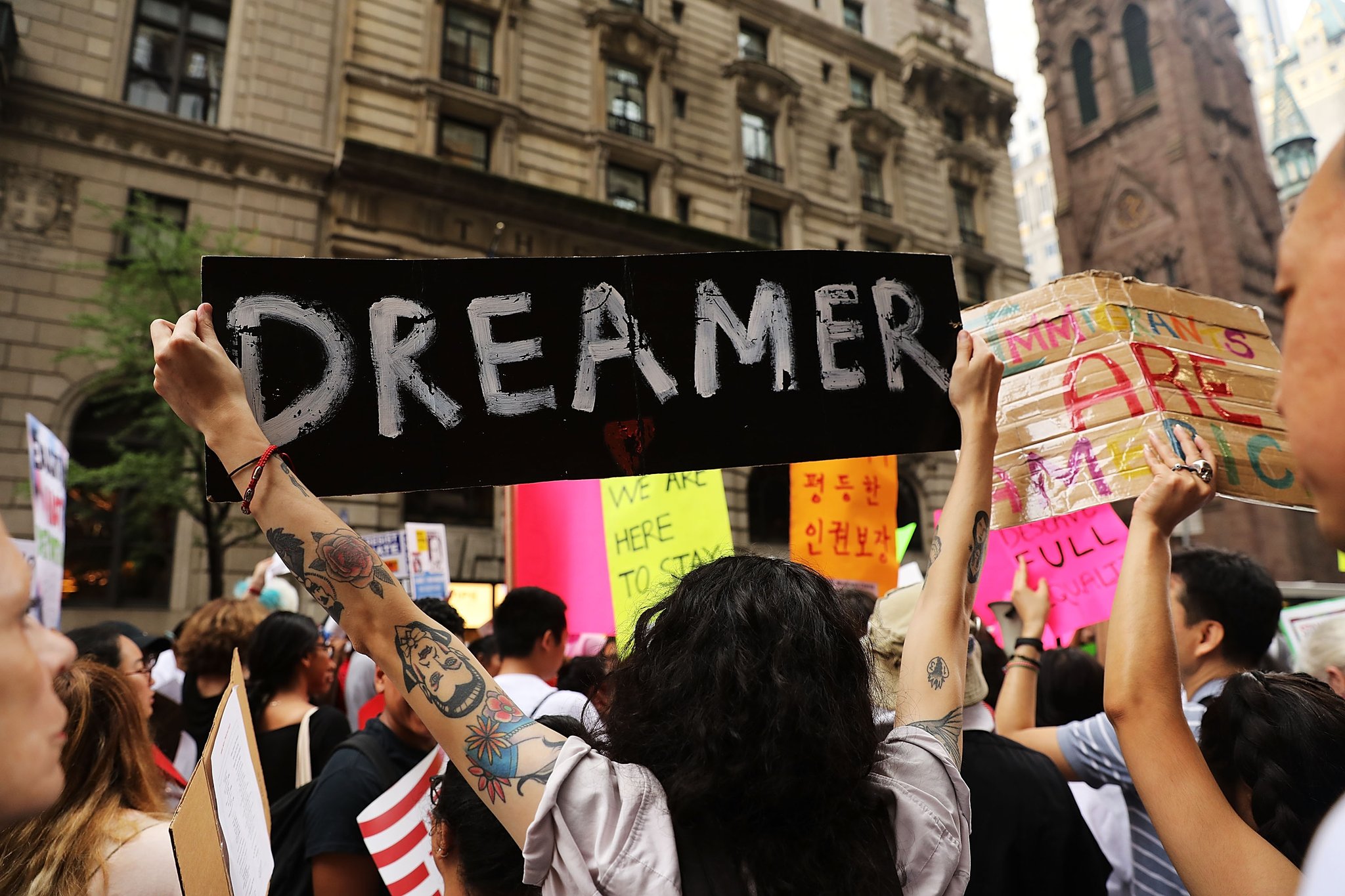
The Ninth Circuit Court of Appeals has sustained a ruling from the Federal District Court striking down the President’s efforts to end the Deferred Action for Childhood Arrivals (DACA) program, handing yet another legal defeat to the Trump Administration on a hot-button issue:
A federal appeals court on Thursday upheld a nationwide injunction against the Trump administration’s attempt to revoke deportation protections for some 700,000 young “Dreamers” who were brought into the United States illegally as children.
Jeff Sessions, who until Wednesday was President Trump’s attorney general, announced in September that the Deferred Action for Childhood Arrivals program would end gradually over six months, prompting legal challenges and protests. Mr. Trump has criticized the program, known as DACA, as an “amnesty-first approach,” and said that President Barack Obama had overstepped his authority by introducing it.
Thursday’s ruling, from the United States Court of Appeals for the Ninth Circuit, was the first time that a federal circuit court had weighed in at this stage on one of the country’s most contentious immigration issues. It brought DACA closer to review by the United States Supreme Court, which ultimately will have to resolve the various legal claims swirling around the program.
The review may already be on a faster track after the Trump administration earlier this week petitioned the Supreme Court to consider the issue immediately, without waiting for rulings in the lower courts. The Supreme Court in February had denied a previous request for expedited review, signaling that the justices at least at that point had preferred to wait for appellate courts to weigh in.
Legal challenges against the administration’s attempt to end DACA are pending in several states. After a series of lower court injunctions against the move, federal appeals courts have taken up the issue in New York, Texas, Washington and now California.
In their opinion on Thursday, the circuit judges in San Francisco upheld a nationwide injunction imposed in January by Judge William Alsup of the Northern District of California, ordering safeguards from deportation to remain in place for Dreamers while the complex legal issues make their way through the courts.
The court consolidated three separate cases that were brought on behalf of the State of California, the University of California system and the beneficiaries of the program themselves. The judges rejected the arguments of government lawyers who contended that DACA had been introduced illegally by President Obama in an act of executive overreach.
Instead, the court found there was a good chance the plaintiffs could succeed in their claim that the Trump administration’s abrupt attempt to rescind the program violated the Constitution’s equal protection clause, based on its disproportionate impact on Latinos.
“The Executive wields awesome power in the enforcement of our nation’s immigration laws. Our decision today does not curb that power, but rather enables its exercise in a manner that is free from legal misconceptions and is democratically accountable to the public,” the court wrote
More from The Washington Post:
A federal appeals court ruled Thursday that President Trump cannot immediately end the program that shields from deportation young undocumented immigrants who were brought to the country as children.
The unanimous decision by a three-judge panel of the U.S. Court of Appeals for the 9th Circuit makes it more likely that the Supreme Court will settle the question. The Trump administration has asked the justices to add it to the docket for this term.
The Deferred Action for Childhood Arrivals program was begun in 2012 by President Barack Obama and has protected nearly 700,000 people brought to this country as children.
The Trump administration moved to end the program in 2017 after Texas and other states threatened to sue to force an end to the program. Then-Attorney General Jeff Sessions advised the Department of Homeland Security to end the program, saying it was probably unlawful and that it could not be defended in court.
But a number of courts around the country have ruled that the administration’s reasoning was incorrect and kept the program in place. Like the other courts, the panel did not question the administration’s power but faulted its approach.
“To be clear: we do not hold that DACA could not be rescinded as an exercise of Executive Branch discretion,” Judge Kim McLane Wardlaw said in the opinion. “We hold only that here, where the Executive did not make a discretionary choice to end DACA — but rather acted based on an erroneous view of what the law required — the rescission was arbitrary and capricious under settled law.”
The panel of judges, all nominated by Democratic presidents, flatly rejected the administration’s position that courts lacked the power to review the executive branch’s immigration actions.
“The government may not simultaneously both assert that its actions are legally compelled, based on its interpretation of the law, and avoid review of that assertion by the judicial branch, whose ‘province and duty’ it is ‘to say what the law is,’ ” Wardlaw said, borrowing the language of the landmark Marbury v. Madison decision.
Wardlaw said the Obama administration was within its powers to enact DACA because it had to make a choice about how to direct limited resources in deporting undocumented immigrants and decided to spare those who came as children, had not committed crimes and were students or in the military.
“The reality is (and always has been) that the executive agencies charged with immigration enforcement do not have the resources required to deport every single person present in this country without authorization,” she said.
And while the opinion does not purport to decide the wisdom of the policy, Wardlaw was clearly sympathetic.
“It is no hyperbole to say that Dulce Garcia embodies the American dream,” is how she begins the opinion, telling the story of a woman brought to this country by her parents as a 4-year-old who now has a thriving law practice in San Diego.
“Recognizing the cruelty and wastefulness of deporting productive young people to countries with which they have no ties, the Secretary of Homeland Security announced a policy in 2012 that would provide some relief to individuals like Garcia, while allowing our communities to continue to benefit from their contributions,” Wardlaw said.
The panel’s decision keeps in place an injunction from the lower court that allows DACA recipients to renew their applications. According to California Attorney General Xavier Becerra, more than 187,000 people “have regained or extended their DACA protections as a result of the court’s injunction, and hundreds of thousands of additional Dreamers are eligible to do so.”
In the Court’s opinion, Judge Kim Wardlaw, who was appointed to the Ninth Circuit by President Clinton in 1998, held that the Administration’s decision to end the DACA program, which was based on the determination made by the acting Secretary of Homeland Security that the program was illegal, was not correct under the law. Instead, the court found, the program was a “permissible exercise of executive discretion,” which essentially amounts to the authority granted by Congress to the Executive Branch under existing law to determine when and how to enforce Federal law. Wardlaw noted in her opinion that “deferred action has been a feature of our immigration system — albeit one of executive invention — for decades; has been employed categorically on numerous occasions; and has been recognized as a practical reality by both Congress and the courts.” Based on the fact that it had concluded that DACA in and of itself was not illegal, the court went on to hold that the parties challenging the Trump Administration’s decision in the consolidated lawsuit, which includes claims by localities in the San Francisco area, the Regents of the University of California, and several beneficiaries under the DACA program itself. Since the court found that DACA itself was not illegal, it went on to hold that the challengers ”are likely to succeed in demonstrating that the rescission must be set aside.”
It is worth noting that the Court’s opinion does not mean that DACA could never be rescinded. For example, the Court noted that if the Administration had framed the decision to end the program as an exercise of the same discretion granted to the Executive Branch that prompted President Obama to enact the program to begin with. However, the court stated that ”We hold only that here, where the Executive did not make a discretionary choice to end DACA — but rather acted based on an erroneous view of what the law required — the rescission was arbitrary and capricious under settled law.” In other words, if the Trump Administration had simply said that it would rescind DACA without providing an explanation then, at least under the logic used by this Court, the decision would have been an acceptable exercise of discretionary Executive Branch power. It is worth noting, though, that other courts have ruled that at least part of the reason that the Administration’s decision was illegal was that it was “arbitrary and capricious” and not supported by sufficient evidence under the Administrative Procedure Act. Under that logic, acting completely without any explanation at all arguably would have been even more problematic. In any case, regardless of the reasoning, the outcome is essentially the same, as is the effect. More than a year after the initial order to end DACA was given, the program remains in effect, and this arguably strengthens the legal case for the challengers since it means that hundreds of thousands of people have acted in reliance on the legality of the program. At this point, ending it arbitrarily is going to be far more difficult for either the Administration or the courts.
On a final note, while the court rejected several claims that the challengers had made under the due process clause, it did hold that they had “stated a plausible equal protection claim.” Specifically, the Court took note of the fact that rescinding DACA has a disproportionate impact on Latinos and persons of Mexican heritage who, not surprisingly, account for some 93% of the people presently benefiting from the DACA program. Because of that, the Court ruled that the challengers were likely to succeed on the merits of their Equal Protection claims against the Trump Administration. In a concurring opinion, Judge John Owens,who agreed with the court’s decision and the remedy, disagreed with the court’s reasoning in part and specifically noted that the challengers had a likelihood of succeeding on the merits of their Equal Protection claims. Owens also argued in favor of keeping the injunction that had been issued by the District Court in place, saying ”The extraordinary practical impact of allowing DACA’s rescission to take effect before a final adjudication of its legality far outweighs the minimal practical impact of keeping the program in place a bit longer.”
The Ninth Circuit’s ruling marks the fifth time that a Federal Court has handed a defeat to the Trump Administration and the fourth time that Federal Judges have issued an order that effectively keeps the DACA program in place indefinitely. In January, a District Court Judge in San Francisco ruled that the Administration’s efforts to repeal the program violated the law and issued an injunction barring the program from going into effect. That ruling was followed roughly a month later by a ruling from a second Federal Judge in Maryland who issued a similar ruling on much the same grounds as his colleague in San Francisco. Last month a Federal Judge in New York City denied a motion seeking to dismiss a similar lawsuit against the Trump Administration order in a ruling that cited many of the same grounds as the previous two orders and which also cited in support of its conclusions rhetoric from the President both in his speeches and in his Tweets. Several months after this, in what many saw as a major setback for the Administration, the Supreme Court declined to disturb the injunction in the San Francisco case, meaning that the government was forced to go through the Ninth Circuit to appeal that case. Finally, in April a District Court Judge in Washington, D.C. issued yet another ruling placing a hold on the Administration’s attempt to bring an end to the DACA program. That ruling was significant in that it differed in one significant respect from the previous respects. Specifically, in addition to keeping the program in place, the ruling also directed the Trump Administration to begin accepting new applicants again. This latest ruling comes in the case decided by Judge William Alsup in San Francisco in January that was rejected for expedited appeal by the Supreme Court back in February. That Supreme Court, of course, was the one that existed prior to the retirement of Justice Anthony Kennedy and the confirmation of Justice Brett Kavanaugh. What the fate of this issue might be when it ultimately makes it to the nation’s highest court on the merits remains to be seen.
Here’s the opinion:
University of California Et… by on Scribd

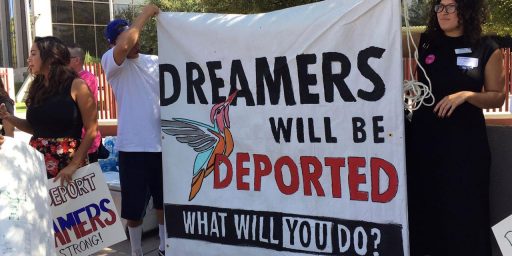
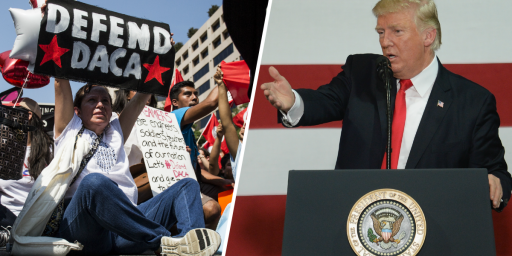
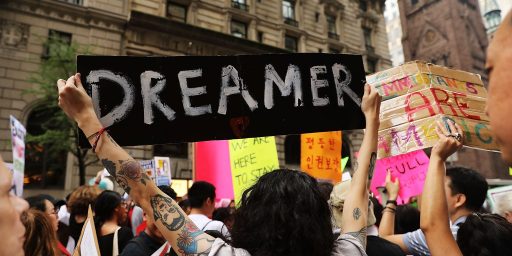
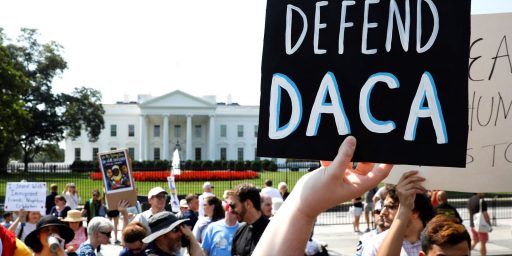
I guess we still have no king.
@OzarkHillbilly:
Not even an orange tin-pot dictator.
Yet.
It does seem like there is a fundamental problem here: you can create a program that disproportionately helps a protected class, but you can never end that program as that would disproportionately harm a protected class.
I support DACA, but I’m having some problems with this. Is it just that the current president is explicitly racist? Did he poison the well with his comments after descending his gold tone escalator?
If the Republican Congress, in the lame duck session, were to vote to end DACA, would that be allowed?
@Gustopher: It’s pretty simple. They need to have a compelling reason to end the program that Obama had a compelling reason to create. Obama had more than just prosecutorial discretion behind his order. They spent years studying the issue, researching the applicable legal precedents and laws, and then formed a coherent and compelling case for creating DACA.
All trump and his cronies have is “We hate greasy wetback spics.”
Surprise surprise, the courts are saying that’s not good enough.
ETA: this has happened time and again where trump has tried to reverse an Obama executive order with one of his own. The difference between the two is that Obama and his admin put in the work to make sure their’s would stand up to legal scrutiny and pass muster in a court of law. trump and his minions think they should just be able to get their way if he holds his breath till he’s blue in the face and stamps his feet loud enough because HE’S KING dawgdammit, and that is all that’s required.
Except, he’s not, and it isn’t.
@OzarkHillbilly:
You are full of it.
See Trump v. Hawaii/Travel Ban and National Labor Relations Board v. Noel Canning
DACA is just a DHS memo.
9th Circuit: Trump Cannot Use an Executive Order to Reverse Obama’s Executive Order on DACA Because We Like Obama and ORANGE MAN BAD
http://ace.mu.nu/archives/378026.php#378026